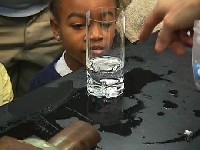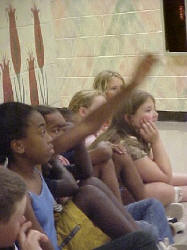I approach scientific education with the perspective that the more ways a student has to explore, understand, and experience a concept, the better the chance they have of developing a firm base and finding inspiration in the sciences.

To that end, I strive to expose the unknown and pique curiosity by encouraging questions, even seemingly random questions. Because, as I tell the students I work with, if you can ask a question there does not appear to be an answer for, you may have just uncovered another excellent opportunity for science and invention. After all, great solutions start with great questions, and new solutions to tough dilemmas are seeds of hope and opportunity.
My ultimate goal at the end of each workshop is to see students leave more inspired, motivated, aware, and educated about the world we live in than when they arrived. It is for that purpose that Launch Zone was created.
Supporting Research
“'Hands-on' activities are an excellent way to improve process skills. Students have the opportunity to see how things work, think about relationships, plan investigations, and learn from their successes and failures." (Learning by Doing, 1987)
“Research indicates that instruction planning for effective teaching includes … recognizing the importance of linking instruction to real life” (Stronge, 2002)

“We must return to the basics, but the basics of the 21st century are not only reading, writing, and arithmetic. They include communication and higher problem-solving skills, and scientific and technological literacy - the thinking tools that allow us to understand the technological world around us. These new basics are needed by all students…” (Report of the National Science Board, 1983)
“Students learn by doing, making, writing, designing, creating, solving.” (Lucas, 1990)
“Variety reawakens student’s involvement in the course and their motivation. Break the routine by incorporating a variety of teaching activities and methods in your course” (Forsyth and McMillan, 1991)
“Students should have both the concepts and process skills necessary to organize and carry out projects in an increasingly complex world. Hands-on instructional activities give them the opportunity to use knowledge and skills to solve problems and find out how and why things happen” (NAEP’s Pilot Study, 1987)
“An instructor’s enthusiasm is a crucial factor in student motivation.” (Davis, 2007)
“The literature on instruction suggests that students whose teachers develop and regularly integrate inquiry -based, hands-on learning activities, critical thinking skills, and assessment into daily lessons consistently out-perform their peers.” (Stronge, 2002)
